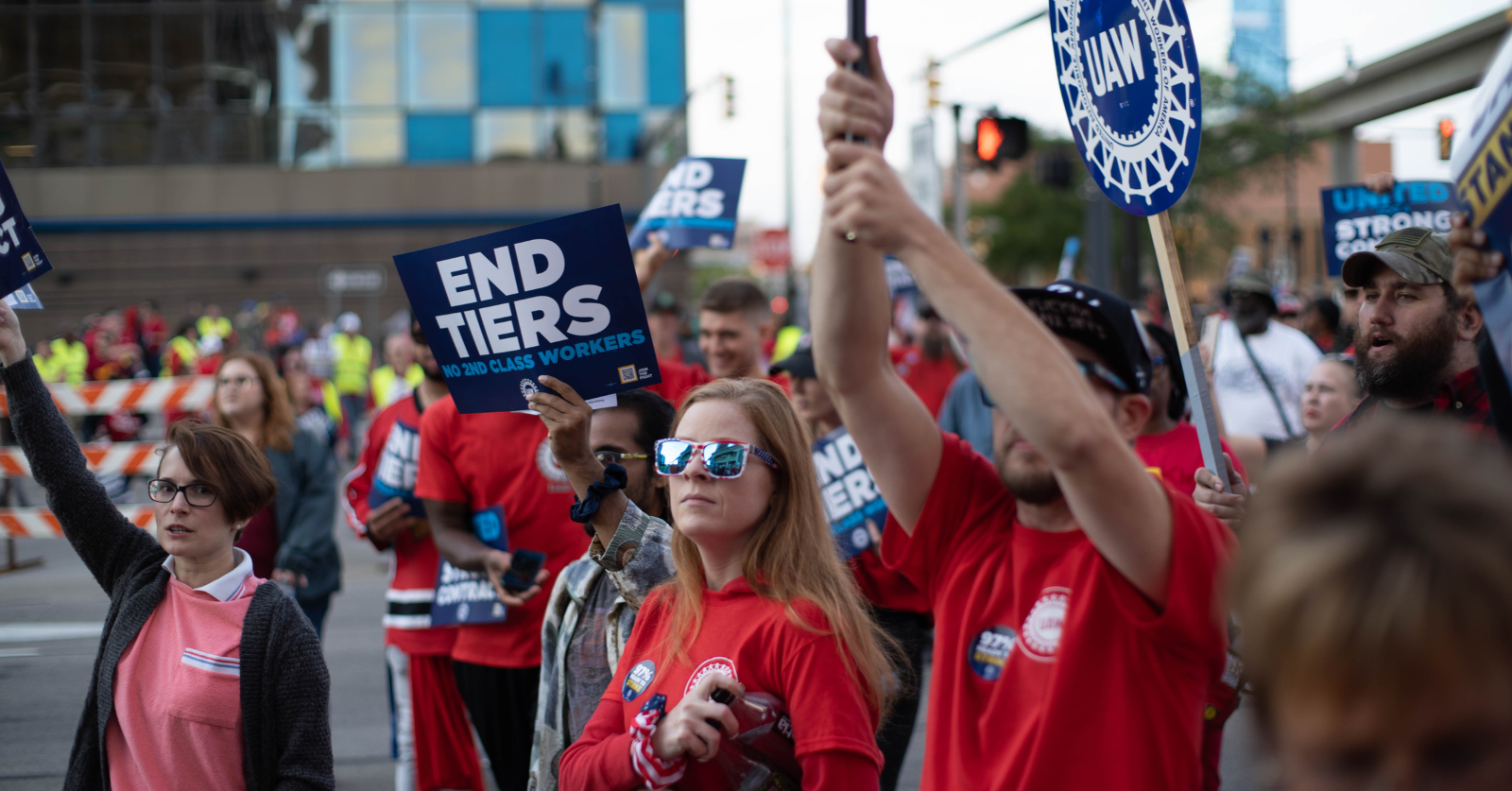An electorally-minded comrade recently asked about a contradiction he felt he saw in Bread & Roses’ approach to building and entering coalitions in the electoral and labor worlds. The comrade pointed out that our caucus tends to be skeptical of joining electoral coalitions with non-socialist groups (like local progressive organizations) and adamant that DSA’s electoral candidates make socialist politics and opposition to the Democratic Party a visible part of their identity. At the same time, when pursuing the rank-and-file strategy in the labor world, we participate in projects that aren’t explicitly socialist (like Labor Notes), and are willing to back forces that are not at all socialist (like Sean O’Brien’s Teamsters leadership coalition campaign in 2021).
Is this approach hypocritical or confused? Not at all. We have different orientations toward coalition building in the worlds of labor and electoral organizing because these two projects offer socialists different opportunities and contradictions.
Our Tasks in Electoral Work Today
When it comes to electoral politics, we recognize that even as DSA accumulates electoral wins, socialist electeds are still far from being strong enough to expect to legislate, govern, or transform the state as socialists. This is because our electeds — some of whom are able to form blocs in legislatures (which we often call “Socialists in Office” committees) — are generally still too disconnected from a mass base from which to draw power. Without a base backing them up and a bigger crew of fellow socialist electeds, they can’t win transformative, socialist reforms or remake the state so it is responsive to ordinary peoples’ needs instead of the capitalists’.
Because they won’t be able to govern as socialists, the most important task for elected socialists is to popularize our politics through the bully pulpit and to organize constituents toward a future where workers and their elected representatives can transform society through mass confrontations in the state, the workplace, and the streets.
We see fighting for big transformative legislative reforms like Medicare for All as means to an end in this period. If pursued with an organizing mindset, these fights can help us meet fired-up segments of the working class, bring them into a class-building project, and give these workers the opportunity to build their own confidence, leadership, and strength through political struggle. As our base and power grows, and as workers recognize their shared interests and come to lead their own militant struggles, the balance of power will tip towards the working class and socialist politics. That will open up a new period where transforming society (aka “governing,” although that word sells what we’re talking about short) is on the table. This strategy is what we call “the democratic road to socialism.”
Today, our potential coalition partners in electoral and legislative fights are almost always progressive non-profits who see the fight for reforms differently than us: rather than a means to build momentum toward revolutionary change, progressives view winning reforms on behalf of workers, and within capitalism, as an end in themselves.
This fits with the politics and material interests of progressive organizations. Their role is not to end capitalism but to soften its worst excesses, and to show yearly progress towards grant metrics that will keep growing their donations from and relevance to their funders in the ruling class. Truly militant struggles, led by workers or by socialists, are a threat to these organizations for two reasons: one, wealthy donors will not fund an organization that is truly a threat to capital, and two, donors will lose interest in an organization that can no longer claim leadership over an issue or community.
If winning big reforms was actually possible right now thanks to a growing and powerful working-class movement, we would be more open to coalitions with any and all groups that want them, even if it’s for different reasons than us. And although winning big transformative reforms isn’t on the agenda now, often it’s still worth it for us to partner with these groups temporarily, to bolster our strength and to be able to talk to wider circles of people than those drawn to socialist politics. However, it is rare to find a progressive organization with a true base of activated members and working-class leaders, and not just an email list that the staff mobilizes for phone-banking and other low-stakes work. That means electoral coalitions offer us more contact with the small layer of local movement staff instead of with the broad working class that we need to be connecting to.
Additionally, getting too close to progressives in long-term coalitions would invite them to put pressure on DSA and our electeds to compromise our politics and our agitational stance toward the Democrats. They will pressure us to horse-trade for small wins here and there or to blunt our influence in the areas they claim as their own turf (like housing, environmental justice, or women’s health). When we allow ourselves to be junior partners in a coalition led by progressives who have many professional and financial ties to the Democratic Party and other capitalist interests, following their approach is fatally confusing for the constituents who we are trying to organize into a self-conscious, militant working class.
(Of course, there are notable exceptions to what’s been said above. The fight for a ceasefire in Gaza or securing abortion rights are winnable demands in the near future because sections of the middle class and even the capitalist class support these struggles. In a period where workers’ power is still low, leftists fighting for these demands have more opportunities to build temporary, broader coalitions and still win — and we should make use of those openings.)
So socialists should be wary of deep electoral coalitions with progressive organizations because the upside is small: they rarely lead an activated base of workers, at best they will view us as junior partners to be managed carefully and discarded as soon as our politics threaten their funding, and socialist electeds are not going to be able to lead in the state with or without these groups anyway.
It’s Different in Labor
The situation is very different for a rank-and-file reform leader or caucus who wins leadership in a union: they must immediately prove they are capable of running the union better than the previous leaders, and structural transformation is often possible in the near term. Ambitious and militant new organizing drives like the one being led by the UAW this year, or democratic reforms like “one member one vote” for electing union presidents, are on the table in unions today. These changes are both achievable and necessary to our project of building militant, left-wing, and democratic unions, and they can be won in coalition with other union leaders and currents regardless of whether they are socialist or not.
A second key difference in the labor world is the potential for consciousness-building. In the union, workers with liberal or even conservative politics are still workers whose material interests align with ours. We can organize alongside them and hope to transform their thinking and politics through shared struggle. This potential is one of the most important reasons we intervene in the labor movement — through forming “coalitions” with workers who don’t yet identify as socialists, we can create the conditions for workers to reach their own conclusions about which side they are on and who their true enemy is. By contrast, the majority of coalition partners available to our socialist electeds are funded or controlled by capitalists and elites whose material self-interest is usually in direct, zero-sum conflict with workers’.
Depending on the terrain and fight we are working in, socialist organizers face different conditions and different logics apply. That’s one of the reasons Bread & Roses is so committed to understanding the current political situation and figuring out what the openings and tasks are. We remain, as always, committed to building a bold and independent left in the US. Doing so will look different in this period in the labor movement and in the electoral arena. We don’t think that’s a contradiction. It’s just good strategy.




